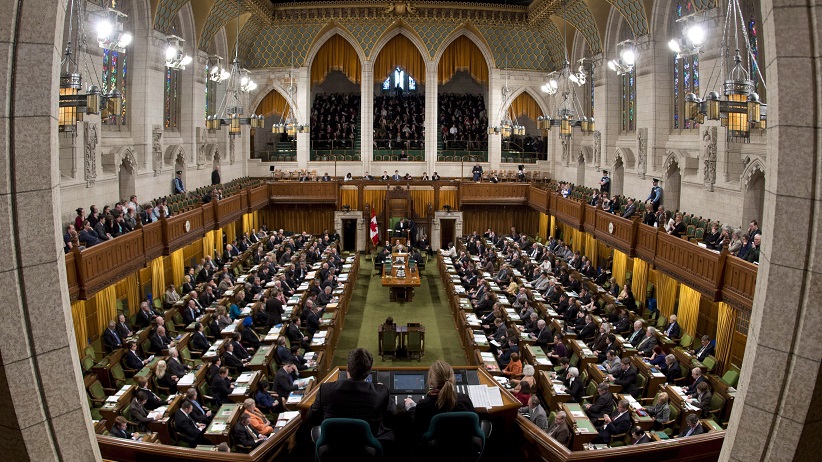Must-see QP: What does PM know about Canada’s partners in Iraq?
Your daily dose of political theatre
Share

Maclean’s is your home for the daily political theatre that is question period. If you’ve never watched, check out our primer. Today, QP runs from 2:15 p.m. until just past 3. We livestream and liveblog all the action.
The must-see moment
When the prime minister takes cheap shots at Justin Trudeau’s apparent wealth, he makes things personal, and people get distracted by the whole charade (take a gander at #QP just past 2:30 p.m.). When he’s not taking cheap shots, however, Stephen Harper sometimes freely admits, almost in passing, to his own ignorance on crucial files. Watch him talk about Iraq.
This afternoon, NDP Leader Tom Mulcair wondered about a persistent Canadian presence on front lines in Iraq, and he recalled the American experience in the same theatre. “Mr. Speaker, Americans aren’t allowed to paint targets for airstrikes. They’re not allowed to accompany Iraqi forces to the front lines. This is exactly what the Prime Minister promised would be the case for Canadian soldiers,” he said. As the country now knows, special forces have directed airstrikes and engaged the enemy on the front lines. Mulcair put a question on the record, “When did the prime minister decide to send Canadian troops into combat?”
Harper could have answered the question a thousand different ways. Here’s what he said: “I know the opposition thinks it’s a terrible thing that we’re actually standing up to jihadists. I know they think it’s a terrible thing that some of these jihadists got killed when they fired on the Canadian military. I don’t know what other militaries are doing, but I know that ours are doing exactly what this Parliament asked to do, and that Canadians are behind them.”
Wait a minute. The prime minister doesn’t know what other militaries are doing? Not only does everyone who cares to look know how much the Americans are spending on their effort, but the Americans also make available a detailed breakdown of the sorties they’ve flown for the purposes of surveillance, airlift and airstrikes, and they publish full transcripts of recent press conferences from the Pentagon. This is all on the public record. Presumably, the Canadian Armed Forces don’t work in isolation when they join overseas coalitions and, now and again, Harper is kept apprised of what everyone else is up to over there.
Perhaps the PM was simply lazy with his words, or flippant to make a point, but there’s a question worth asking: How much does he know about the rules Canada’s partners have established for their own missions in Iraq?
The recap
The context
Wars are expensive, and the Pentagon isn’t shy about the cost of its fight against Islamic State. The Department of Defense is upfront about the escalating price tag of Operation Inherent Resolve. Scroll down a little bit on the mission’s homepage, and there it is: “As of Jan. 9, 2015, the total cost of operations related to ISIL since kinetic operations started on Aug. 8, 2014 is $1.3 billion and the average daily cost is $8.3 million.” That kind of transparency, of course, invites more fun with numbers; for example, in the 30 seconds it took you to read this far, the United States spent another $3,000 somewhere in Iraq or Syria. The DOD knows the operation’s critics will use all kinds of arithmetic to discredit the mission’s hefty cost, but somebody who makes decisions thought disclosure was worth the fuss.
Compare that data to the cost of Canadian advisers and airstrikes in Iraq, and you hit a snag. The federal government won’t release the accumulated cost, or even any existing estimates, of Operation Impact. NDP MP Jack Harris tried to shake down the Department of Defence with a question on the order paper, but the government wouldn’t say a peep, except that costs would be disclosed 90 days after the mission’s conclusion. Defence Minister Rob Nicholson’s excuse was that cost estimates are simply best guesses, and not to be trusted. They’re “dynamic and evolve with the refinement of planning and operational requirements.” Then some more bafflegab: “Estimates are updated regularly to support planning efforts and decision-making, and therefore any estimate provided would be inaccurate.”
As for the big reveal, Nicholson looked somewhere down the road: “The costs of a mission are available through the regular parliamentary process, including with the publication of the annual departmental performance report or 90 days following the end of the mission.”
Harris confronted the minister yesterday during question period and made little headway. As bombs continue to drop and advisers continue to assist, costs continue to mount. And it’s well known that Americans just spent another few thousand dollars doing their part.